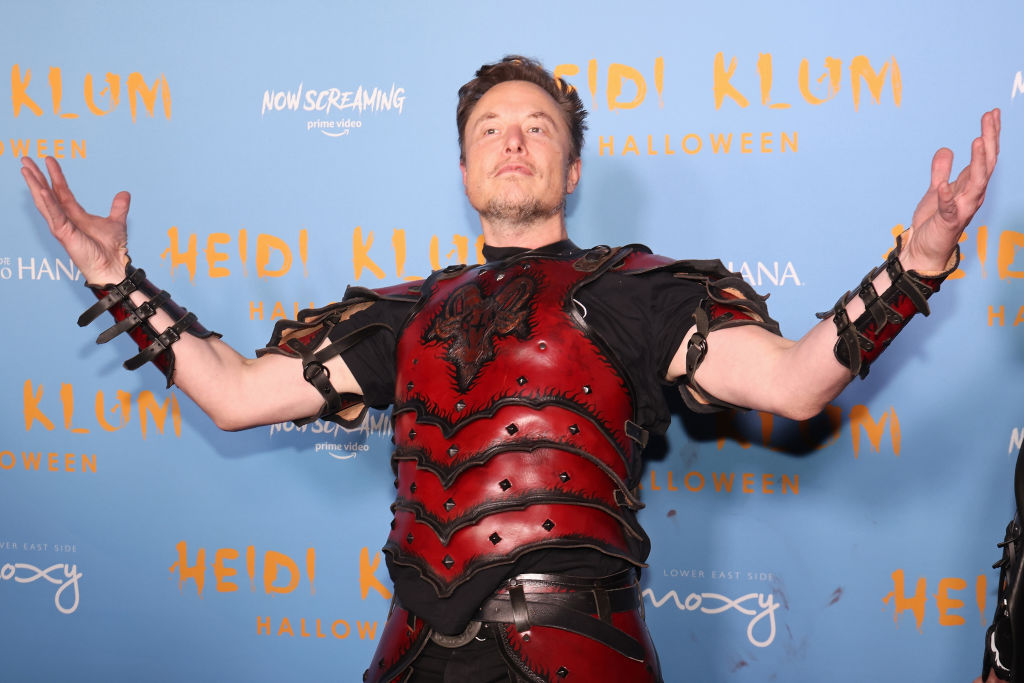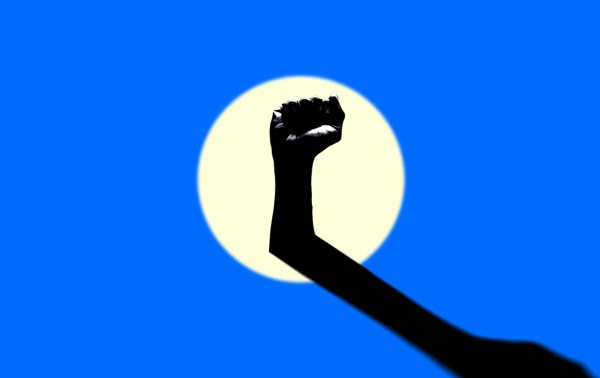Elon Musk is the nation’s foremost culture warrior.
So says Rich Lowry in a new column and I’m inclined to agree, as it seems fitting that a faction as shallow as the populist right should be led by a general who’s not meaningfully conservative in any traditional sense.
Elon isn’t fighting for smaller government, more guns, and fewer abortions. He’s getting off on spiting liberal scolds, the grandest aspiration of most Very Online red-pilled culture warriors.
His career arc parallels the trajectory of the modern GOP, forgoing more productive pursuits to focus on the important work of needling his political enemies as much as possible.
It’s strange to think that a lowbrow troll who bought a social media platform might supplant a lowbrow troll who got elected leader of the free world as culture-warrior-in-chief for right-wing activists, but Lowry has a point. All of the political energy among the MAGA wing lately has flowed toward cheering on Elon Musk rather than Donald Trump, the latter’s newly declared presidential campaign notwithstanding.That’s partly Trump’s own fault, as his lackluster campaign launch has been curiously, ominously “low energy.” (Posting compulsively on Truth Social while eschewing campaign rallies feels like another case of a powerful man’s priorities being thrown badly out of whack by social media.) But Musk is contributing to his predicament, Joshua Green of Bloomberg argued in a column yesterday.
Media manipulation is Trump’s great political gift, one he used to brilliant effect in 2016 in smothering his Republican opponents. Lately the tables have turned, though: It’s Musk who’s sucked the proverbial oxygen out of the room with his Twitter antics, keeping the press in an uproar. Trump’s own former campaign manager has been left marveling at the turnabout. “Anytime he wanted, Trump could change the news cycle with a tweet. He can’t do that anymore. Now Elon is that guy,” Steve Bannon told Green. “He’s throwing bombs every day — look at the Hunter Biden story. It’s blowing up. He has the media on a string. Look at every news site in the country—five stories on him every day. He’s got BDE: ‘Big Dick Energy.’ That’s supposed to be Trump. Right now, it’s all Elon.’”
Musk has certain advantages in competing for the attention of conservative populists. His platform reaches farther than Trump’s does, for one thing, and his cultural hobby horses are more in line with theirs. Even diehard election truthers must be bored with Trump’s mania about the 2020 result by now; meanwhile Musk is offering them a daily grievance smorgasbord by tweaking Fauci and “pronouns,” complaining about the “woke mind virus,” and exposing liberal bias among his predecessors at the company with the so-called “Twitter Files.”
Revealing the Twitter Files was especially clever since it delivers (or purports to deliver) something populists crave, evidence of an honest-to-goodness conspiracy among elites against them. Trump understood that too; his first big splash in politics, you may recall, came in 2011 when he teased gullible Republicans with claims that his investigators would soon reveal the truth about Barack Obama’s birth certificate. From birtherism to QAnon to the ivermectin craze, the wildest and wooliest populists lust after secret knowledge that the ruling class supposedly doesn’t want them to know. That’s what Elon is giving them by airing Twitter’s dirty laundry.
And the punchline is that he’s doing it in a way that benefits … Donald Trump. The last few “drops” of the Twitter Files have had to do with the company’s decision to ban Trump after January 6, an act of civic hygiene at a moment when a deranged president seemed capable of anything but one treated by Musk and his enablers as somehow unfair. Either way, the lesson is clear: When it comes to fighting the libs on Trump’s behalf, Musk is doing a better job of it these days than Trump himself.
Lowry is right, in other words, that Musk has replaced Trump as America’s foremost right-wing culture warrior (read: troll) for the moment. But this passage from today’s column brought me up short.
The fearless, shoot-from-the-hip Musk is, like Trump before him, a barbarian at the gate and a heretic. His takeover of Twitter is like the Vikings sacking the famous English monastery of Wearmouth-Jarrow in the eighth century. Questioning Fauci is like the Albigensians challenging monotheism in the 13th century. Mocking pronouns is like questioning divine-right kingship in the age of absolute monarchies.
It’s strange to imagine the world’s richest man—sorry, second-richest—as a vandal or dissident leading the charge against entrenched power. Particularly when Musk’s own monarchical pretensions at Twitter are key to his appeal to right-wing populists.
Ross Douthat wrote a few days ago about “King Elon,” and Musk’s power over his platform does resemble a monarch’s. But I wonder if the better analogy for him, and for Trump, is to strongmen who emerge during a counterrevolution.
The right had something of a revolutionary moment during the Tea Party era. It was intensely idealistic at first, with endless chatter about “constitutionalism,” and worked through democratic channels to sweep Republicans to power in 2010 and 2014. But the revolution faltered when government didn’t change meaningfully once the GOP took charge of Congress. And because revolution inevitably deteriorates into factions squabbling with each other over which direction it should take as it evolves, it grew chaotic and directionless.
No wonder that periods of populist idealism often give way to dictatorship. Bickering factions finally put aside their differences and rally behind the new ruler or perish if they refuse. The ruler restores order and charts a political path forward. As he acts forcefully to achieve revolutionary goals, he comes to be viewed as superior to democracy as an instrument of the popular will.
Revolution and counterrevolution is how we went from populist conservatives putting iconography about Washington and Jefferson on their walls in 2010 to joining a personality cult built around the host of The Apprentice a decade later. They gave up at some point on reforming the system through normal means. Ultimately only a human wrecking ball with autocratic impulses would do.
Their problem is that Trump didn’t advance the revolution much either.
He talked a lot about building the wall. He slapped some tariffs on China. But in the end, his biggest legislative accomplishment was a Bush-style tax cut for the rich. Populists who idolize him have spent years grasping for ways to cope with their disappointment. Some point to the Russia investigation of Trump’s first two years as having unfairly hobbled him, shifting blame for his failures to the left. Fringier types like QAnoners retreat into nonsense about how Trump did do amazing things as president, like fighting the Satanic cabal of Democratic child molesters, but it’s all necessarily very secret and happening out of public view.
Few will cop to being disappointed, not wanting to admit that their enormous emotional investment in him didn’t pay off, but the hard fact is that he didn’t make America great again. Opioids are still a crisis. Most jobs overseas didn’t come home. Even the long-awaited end of Roe v. Wade hasn’t caused a sea change in the number of abortions in the U.S.
The strongman wasn’t as strong as they’d hoped. Trump retains enough clout on the right to wish dissident Republicans into the cornfield, to borrow from yesterday’s analogy, but he’s never demonstrated much of a knack at punishing the base’s Democratic or institutional enemies. The “system,” to borrow one of his favorite words, proved too big for him to subdue.
For cripes sake, he even employed Anthony Fauci, the target of Musk’s tweet.
King Elon is different. He doesn’t need to negotiate complex competing power centers in a diffuse system in order to impose his will, risking frustration or disaster at every turn. He bought the system. He owns it, literally. There are no power centers beside him. His word is law.
He can wish anyone into the virtual cornfield that he likes, Democrats included. For populist righties, Twitter is now a safe space, to borrow a term.
He’s giving Trump’s base what Trump never could, in other words, a reality in which a leader who sympathizes with them and disdains their enemies rules with an iron fist. Among some of his admirers there’s even a whiff of “divine-right kingship,” to borrow Lowry’s term.
Conservatives complained for years about Twitter’s liberal bias, mostly for naught. Trump whined about it periodically to no effect. King Elon actually put a stop to it, replacing rule by a progressive clergy (in Douthat’s formulation) with a sympathetic populist-right monarch.
That’s the post-liberal dream. Leveling the playing field so the rules apply equally to all is the classical liberal model of government but ultimately leads to ruin, they insist, since institutions that enforce those rules are either left-wing by design, end up being coopted by the left, or drift left organically. The only way to prevent that is to tilt the playing field so that the rules favor your own interests.
King Elon might just do it.
Whether his reign will be quite as benevolent a dictatorship as populists hope is unclear. But whether it will be a dictatorship of some sort is not.
It’s amusing to recall what Elon said about moderating content soon after buying Twitter. He intended to organize a “moderation council” to rule on suspensions, he declared, vowing that “no major content decisions or account reinstatements will happen before the council convenes.” That’s just the sort of calming nod to good governance you’d expect from a strongman who’s suddenly seized power somewhere. No false moves, everything by the book. Government by multiparty deliberation, not by dictatorial whim.
Less than a month later, he threw all of it out and declared a mass amnesty for suspended accounts based on nothing more considered than an unscientific, easily spammed Twitter poll.
Capriciousness and hypocrisy have peppered the first few months of his reign. For all of Musk’s solemn tributes to free speech, he suspended multiple accounts for impersonating him after his new verification system was introduced. He may or may not have banned a user for posting a video of him being booed by the crowd at a Dave Chappelle stand-up show. Despite the conservative uproar over evidence of “shadowbanning” in the Twitter Files, Musk may be guilty of that too with respect to an account that tracks the whereabouts of his private jet.
The Twitter Files had to be published for the sake of transparency and accountability, he’s said. Meanwhile, he’s asked all remaining Twitter employees to sign nondisclosure agreements barring them from revealing company information.
Some of his decisions to keep repellent figures off the platform have also seemed arbitrary. Alex Jones won’t be reinstated because of his conspiracy theories about the Sandy Hook murders. (“I have no mercy for anyone who would use the deaths of children for gain, politics or fame,” Musk explained.) Jones deserves that. But does he deserve it more than Andrew Anglin, the founder of the white supremacist site The Daily Stormer, who was reinstated on December 2? Does he deserve it more than the many other previously banned racists users who are back cranking out bigoted tweets since rejoining the platform at Musk’s sufferance?
At least Jones is anti-Hitler.
When Kanye West posted the image of a swastika inside a Star of David, that also crossed Musk’s fuzzy red line. The tweet was removed and West’s account was suspended (again). When asked why, Musk said, “At a certain point, you have to say what is incitement to violence. Because that is against the law in the U.S., you can’t just have a ‘let’s go murder someone club,’ that’s not actually legal.” West’s swastika image wasn’t incitement to violence. It was hateful and could conceivably inspire others to behave violently by encouraging prejudice, but that’s true of all hateful rhetoric on the platform. There’s no court in America that would convict West of incitement within the First Amendment meaning of the term for posting that image.
We’re left with a moral and conceptual tangle in which, per the Twitter Files, Donald Trump is a martyr who was unfairly suspended while trying to incite a coup yet Kanye West is persona non grata for posting the sort of thing you might find on Andrew Anglin’s website. It makes no sense.
But it doesn’t need to. It only needs to make sense to King Elon. Monarchs don’t derive legitimacy from the logic of their decisions, as judges do. They derive legitimacy from divine right. Or from the purchasing power of $44 billion. Which are pretty similar.
The last 24 hours encapsulate perfectly the arc of Musk’s first few months in charge. On Monday Twitter’s Truth and Safety Council was set to meet with company executives to discuss how changes to the platform have affected content, another nod to by-the-book deliberative government. Less than an hour before the meeting was set to begin, members got an email informing them that the council was hereby dissolved. Even for a strongman, preemptively disbanding an official body that might try to restrain his behavior seems a little on-the-nose.
That decision came two days after Musk publicly smeared Yoel Roth, the former head of safety at the company, by insinuating that Roth wanted children to access adult content online. His belief was based on a distortion of something Roth had written in his doctoral thesis, but no matter. Word got around. Reportedly Roth has now had to flee his home for fear that populists obsessed with “grooming” might hunt him down.
It might be the first “off with his head” episode of King Elon’s reign.
Musk may end up being a letdown for the right, as Trump was.
He’s not really an absolute monarch, after all. However much in principle he may want to rule of, by, and for the edgelords, even the world’s second-richest man has creditors. He’s desperate to monetize his new toy to keep those creditors happy. Chasing off the progressive half of his user base by being too heavy-handed in favoring the right or too vindictive in owning the libs will make the task that much harder.
Maybe he’ll content himself with winking at QAnoners while moderating content in a more or less evenhanded way. The post-liberal fantasy of government by whim of a friendly autocrat may be dashed again, this time in virtual space.
But if Musk can carry on his circus act of out-Trumping Trump, his Twitter takeover may pay off for the right in a grander way.
The more King Elon proves himself a better troll than the master, the more he continues to scratch the populist itch to own the libs, the less reason Republicans will have to nominate Trump a third time. They can get the policies they want by nominating Ron DeSantis, all wrapped up in a much more electable package. If they can also get their fill of daily performative cultural antagonism from Musk, what’s left of the argument for sticking with Trump again? All he’d have left to recommend him is spite.
Which, for this electorate, admittedly might be enough.
Whatever happens, Trump and DeSantis should be grateful that Musk isn’t a natural-born citizen. I wouldn’t want to face King Elon, the autocrat who made good, in a Republican presidential primary if I were them.







Please note that we at The Dispatch hold ourselves, our work, and our commenters to a higher standard than other places on the internet. We welcome comments that foster genuine debate or discussion—including comments critical of us or our work—but responses that include ad hominem attacks on fellow Dispatch members or are intended to stoke fear and anger may be moderated.
With your membership, you only have the ability to comment on The Morning Dispatch articles. Consider upgrading to join the conversation everywhere.